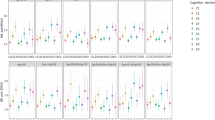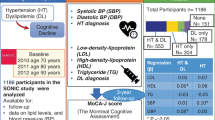Key Summary Points
This study aims to uncover the association between frecuent conditions in older persons, according to their blood pressure: memory complaints, depression and incident cognitive impairment.
AbstractSection FindingsIndividuals with depressive symptoms and/or subjective memory complaints have a higher risk of developing incident cognitive impairment when high blood pressure is present.
AbstractSection MessageThere are several treatable risk factors, which could be managed through counseling regarding healthy lifestyle habits, including HBP prevention which could importantly impact outcomes in older persons.
Abstract
Purpose
High blood pressure is a relevant risk factor for vascular damage, leading to the development of depressive symptoms and dementia in older adults. Moreover, subjective memory complaints are recognized as an early marker of cognitive impairment. However, it has been established that subjective memory complaints could also be a reflection of depressive symptoms. The objective of this paper is to assess the impact of depressive symptoms and subjective memory complaints on the incidence of cognitive impairment in older adults with high blood pressure.
Methods
This is a secondary analysis of the Mexican Health and Aging Study, a representative cohort composed by individuals aged ≥ 50 years. Participants with cognitive impairment in 2012 were excluded since the outcome was incident cognitive impairment in 2015. Four groups were created according to depressive symptomatology and subjective memory complaints status; analyses were stratified according to blood pressure status. The odds incident cognitive impairment was estimated through logistic regression models.
Results
A total of 6327 participants were included, from which 6.44% developed cognitive impairment. No differences were seen regarding the development of cognitive impairment in participants without high blood pressure. However, increased risk was evident in those with both high blood pressure and depressive symptoms (OR = 2.1, 95% CI 1.09–4.09, p = 0.026) as with high blood pressure, depressive symptoms and subjective memory complaints (OR = 1.91, 9% CI 1.4–3.2, p = 0.001).
Conclusion
Individuals with depressive symptoms and/or subjective memory complaints have a higher risk of developing incident cognitive impairment when high blood pressure is present. Our results suggest that a sequence of events related to altered cerebral vascular dynamics is possible.

Similar content being viewed by others
References
Gutierrez-Robledo LM (2002) Looking at the future of geriatric care in developing countries. J Gerontol Ser A Biol Sci Med Sci [Internet] 57(3):M162–7. https://academic.oup.com/biomedgerontology/article-lookup/doi/10.1093/gerona/57.3.M162. Accessed 13 Jan 2019
Miguel Gutiérrez-Robledo L, Arrieta-Cruz I, Luis *, Gutiérrez M, Dirección R (2015) Demencias en México: la necesidad de un Plan de Acción GACETA MÉDICA DE MÉXICO SIMPOSIO Correspondencia [Internet]. http://www.anmm.org.mx. Accessed 13 Jan 2019
Mejia-Arango S, Gutierrez LM (2011) Prevalence and incidence rates of dementia and cognitive impairment no dementia in the mexican population. Whitfield K, Angel JL, Wong R (eds) J Aging Health [Internet] 23(7):1050–1074. http://www.ncbi.nlm.nih.gov/pubmed/21948770. Accessed 13 Jan 2019
Rizzi L, Rosset I, Roriz-Cruz M (2014) Global epidemiology of dementia: Alzheimer’s and vascular types. Biomed Res Int [Internet] 2014:908915. http://www.ncbi.nlm.nih.gov/pubmed/25089278. Accessed 13 Jan 2019
Frankish H, Horton R (2017) Prevention and management of dementia: a priority for public health. Lancet [Internet] 390(10113):2614–2615. http://www.ncbi.nlm.nih.gov/pubmed/28735854. Accessed 13 Jan 2019
Taragano FE, Allegri RF, Krupitzki H, Sarasola DR, Serrano CM, Loñ L et al (2009) Mild behavioral impairment and risk of dementia: a prospective cohort study of 358 patients. J Clin Psychiatry [Internet] 70(4):584–592. http://www.ncbi.nlm.nih.gov/pubmed/19323967. Accessed 13 Jan 2019
Balash Y, Mordechovich M, Shabtai H, Giladi N, Gurevich T, Korczyn AD (2013) Subjective memory complaints in elders: depression, anxiety, or cognitive decline? Acta Neurol Scand [Internet] 127(5):344–350. http://www.ncbi.nlm.nih.gov/pubmed/23215819. Accessed 13 Jan 2019
Jacinto AF, Brucki SMD, Porto CS, Arruda Martins M de, Nitrini R (2014) Subjective memory complaints in the elderly: a sign of cognitive impairment? Clinics (Sao Paulo) [Internet] 69(3):194–197. http://www.ncbi.nlm.nih.gov/pubmed/24626946. Accessed 13 Jan 2019
Mitchell AJ, Beaumont H, Ferguson D, Yadegarfar M, Stubbs B (2014) Risk of dementia and mild cognitive impairment in older people with subjective memory complaints: meta-analysis. Acta Psychiatr Scand [Internet] 130(6):439–51. http://www.ncbi.nlm.nih.gov/pubmed/25219393. Accessed 13 Jan 2019
Montenegro Peña M (2015) Quejas subjetivas de memoria en el envejecimiento y en adultos jóvenes: variables implicadas. https://dialnet.unirioja.es/servlet/tesis?codigo=126691. Accessed 13 Jan 2019
Alexopoulos GS, Kelly RE (2009) Research advances in geriatric depression. World Psychiatry [Internet] 8(3):140–149. http://www.ncbi.nlm.nih.gov/pubmed/19812743. Accessed 13 Jan 2019
Geda YE, Roberts RO, Mielke MM, Knopman DS, Christianson TJH, Pankratz VS et al (2014) Baseline neuropsychiatric symptoms and the risk of incident mild cognitive impairment: a population-based study. Am J Psychiatry [Internet] 171(5):572–581. http://www.ncbi.nlm.nih.gov/pubmed/24700290. Accessed 13 2019
Skoog I, Gustafson D (2006) Update on hypertension and Alzheimer’s disease. Neurol Res [Internet] 28(6):605–611. http://www.ncbi.nlm.nih.gov/pubmed/16945211. Accessed 13 Jan 2019
Downer B, Chen N-W, Wong R, Markides KS (2016) Self-reported health and functional characteristics of Mexican and Mexican American adults aged 80 and over. J Aging Health [Internet] 28(7):1239–1255. http://www.ncbi.nlm.nih.gov/pubmed/27590800. Accessed 13 Jan 2019
Wong R, Michaels-Obregon A, Palloni A (2017) Cohort profile: the Mexican health and aging study (MHAS). Int J Epidemiol [Internet] 46(2):e2. http://www.ncbi.nlm.nih.gov/pubmed/25626437. Accessed 13 Jan 2019
Glosser G, Wolfe N, Albert ML, Lavine L, Steele JC, Calne DB et al (1993) Cross-cultural cognitive examination: validation of a dementia screening instrument for neuroepidemiological research. J Am Geriatr Soc [Internet] 41(9):931–939. http://www.ncbi.nlm.nih.gov/pubmed/8409180. Accessed 13 Jan 2019
Mejía-Arango S, Wong R, Michaels-Obregón A (2015) Normative and standardized data for cognitive measures in the Mexican Health and Aging Study. Salud Publica Mex [Internet] 57 Suppl 1(0 1):S90–S96. http://www.ncbi.nlm.nih.gov/pubmed/26172239. Accessed 13 Jan 2019
American Psychiatric Association (2000) Diagnostic and statistical manual of mental disorders, 4 edn. American Psychiatric Association, Washington, DC. text revision. https://scholar.google.com/scholar_lookup?title=Diagnostic+and+statistical+manual+of+mental+disorders&publication_year=2000&
Yesavage JA, Brink TL, Rose TL, Lum O, Huang V, Adey M et al (1982) Development and validation of a geriatric depression screening scale: a preliminary report. J Psychiatr Res 17(1):37–49. http://www.ncbi.nlm.nih.gov/pubmed/7183759. Accessed 13 Jan 2019
Aguilar-Navarro SG, Fuentes-Cantú A, Avila-Funes JA, García-Mayo EJ (2007) Validity and reliability of the screening questionnaire for geriatric depression used in the Mexican Health and Age Study. Salud Publica Mex [Internet] 49(4):256–262. http://www.ncbi.nlm.nih.gov/pubmed/17710274. Accessed 13 Jan 2019
Mayfield D, McLeod G, Hall P (1974) The CAGE questionnaire: validation of a new alcoholism screening instrument. Am J Psychiatry [Internet] 131(10):1121–1123. http://www.ncbi.nlm.nih.gov/pubmed/4416585. Accessed 13 Jan 2019
Ismail Z, Malick A, Smith EE, Schweizer T, Fischer C (2014) Depression versus dementia: is this construct still relevant? Neurodegener Dis Manag [Internet] 4(2):119–126. https://www.futuremedicine.com/doi/10.2217/nmt.14.5. Accessed 13 Jan 2019
Singh-Manoux A, Dugravot A, Fournier A, Abell J, Ebmeier K, Kivimäki M et al (2017) Trajectories of depressive symptoms before diagnosis of dementia. JAMA Psychiatry [Internet] 74(7):712. http://www.ncbi.nlm.nih.gov/pubmed/28514478. Accessed 13 Jan 2019
Steffens DC (2017) Late-life depression and the prodromes of dementia. JAMA Psychiatry [Internet] 74(7):673. http://www.ncbi.nlm.nih.gov/pubmed/28514459. Accessed 13 Jan 2019
Ownby RL, Crocco E, Acevedo A, John V, Loewenstein D (2006) Depression and risk for alzheimer disease. Arch Gen Psychiatry [Internet] 63(5):530. http://www.ncbi.nlm.nih.gov/pubmed/16651510. Accessed 13 Jan 2019
Reppermund S, Zhuang L, Wen W, Slavin MJ, Trollor JN, Brodaty H et al (2014) White matter integrity and late-life depression in community-dwelling individuals: diffusion tensor imaging study using tract-based spatial statistics. Br J Psychiatry [Internet] 205(04):315–320. http://www.ncbi.nlm.nih.gov/pubmed/25147370. Accessed 13 Jan 2019
Salloway S, Malloy P, Kohn R, Gillard E, Duffy J, Rogg J et al (1996) MRI and neuropsychological differences in early- and late-life-onset geriatric depression. Neurology [Internet] 46(6):1567–1574. http://www.ncbi.nlm.nih.gov/pubmed/8649550. Accessed 13 Jan 2019
Barnes DE, Alexopoulos GS, Lopez OL, Williamson JD, Yaffe K (2006) Depressive symptoms, vascular disease, and mild cognitive impairment. Arch Gen Psychiatry [Internet] 63(3):273. http://www.ncbi.nlm.nih.gov/pubmed/16520432. Accessed 13 Jan 2019
Thomas A, Kalaria RN, O’Brien JT (2004) Depression and vascular disease: what is the relationship? J Affect Disord [Internet] 79(1–3):81–95. http://www.ncbi.nlm.nih.gov/pubmed/15023483. Accessed 13 Jan 2019
Brommelhoff JA, Gatz M, Johansson B, McArdle JJ, Fratiglioni L, Pedersen NL (2009) Depression as a risk factor or prodromal feature for dementia? Findings in a population-based sample of Swedish twins. Psychol Aging [Internet] 24(2):373–384. http://www.ncbi.nlm.nih.gov/pubmed/19485655. Accessed 13 Jan 2019
Binder N, Schumacher M (2016) Incidence of dementia over three decades in the Framingham heart study. N Engl J Med [Internet] 375(1):92–94. http://www.ncbi.nlm.nih.gov/pubmed/27406363. Accessed 13 Jan 2019
Bhalla RK, Butters MA, Mulsant BH, Begley AE, Zmuda MD, Schoderbek B et al (2006) Persistence of neuropsychologic deficits in the remitted state of late-life depression. Am J Geriatr Psychiatry [Internet] 14(5):419–427. http://www.ncbi.nlm.nih.gov/pubmed/16670246. Accessed 13 Jan 2019
Hernández-Hernández R, Silva H, Velasco M, Pellegrini F, Macchia A, Escobedo J et al (2010) Hypertension in seven Latin American cities: the Cardiovascular Risk Factor Multiple Evaluation in Latin America (CARMELA) study. J Hypertens [Internet] 28(1):24–34. http://www.ncbi.nlm.nih.gov/pubmed/19809362. Accessed 13 Jan 2019
Cano-Gutierrez C, Reyes-Ortiz CA, Samper-Ternent R, Gélvez-Rueda JS, Borda MG (2015) Prevalence and factors associated to hypertension among older adults in Bogotá, Colombia. J Aging Health [Internet] 27(6):1046–1065. http://www.ncbi.nlm.nih.gov/pubmed/25804902. Accessed 13 Jan 2019
McLeod KJ, Jain T (2017) Postural hypotension and cognitive function in older adults. Gerontol Geriatr Med [Internet] 3:2333721417733216. http://www.ncbi.nlm.nih.gov/pubmed/28979924. Accessed 13 Jan 2019
Cheng S, Xanthakis V, Sullivan LM, Vasan RS. Blood pressure tracking over the adult life course. Hypertension [Internet] 60(6):1393–1399. http://www.ncbi.nlm.nih.gov/pubmed/23108660. Accessed 13 Jan 2019
Cipolla MJ (2009) The cerebral circulation [Internet]. Morgan Claypool Life Sci. http://www.ncbi.nlm.nih.gov/pubmed/21452434. Accessed 13 Jan 2019
Livingston G, Sommerlad A, Orgeta V, Costafreda SG, Huntley J, Ames D et al (2017) Dementia prevention, intervention, and care. Lancet [Internet] 390(10113):2673–2734. http://www.ncbi.nlm.nih.gov/pubmed/28735855. Accessed 13 Jan 2019
Fladby T, Pålhaugen L, Selnes P, Waterloo K, Bråthen G, Hessen E et al (2017) Detecting at-risk alzheimer’s disease cases. J Alzheimer’s Dis [Internet] 60(1):97–105. http://www.ncbi.nlm.nih.gov/pubmed/28826181. Accessed 13 Jan 2019
Wang X-J, Xu W, Li J-Q, Cao X-P, Tan L, Yu J-T (2019) Early-life risk factors for dementia and cognitive impairment in later life: a systematic review and meta-analysis. In: Zhu L-Q (ed) J Alzheimer’s Dis [Internet] 67(1):221–229. http://www.ncbi.nlm.nih.gov/pubmed/30636739. Accessed 21 Jan 2019
Funding
The MHAS was sponsored by the National Institutes of Health/National Institute on Aging (Grant NIH R01AG018016), as well as the Sealy Center on Aging at the University of Texas Medical Branch in Galveston and by the Health of Older Minorities T32AG00270 training Grant from the National Institute on Aging.
Author information
Authors and Affiliations
Corresponding author
Ethics declarations
Conflict of interest
The authors declared no potential conflicts of interest with respect to the research, authorship and/or publication of this article.
Ethical approval
The Institutional Review Boards or Ethics Committees of the University of Texas Medical Branch in the United States, the Instituto Nacional de Estadística y Geografía, the Instituto Nacional de Salud Pública, the Instituto Nacional de Geriatría in Mexico and the Pontificia Universidad Javeriana approved the study. The rights of human participants were protected, the procedures were according to the Helsinki declaration.
Informed consent
All patients signed informed consent prior to the assessments.
Additional information
Publisher's Note
Springer Nature remains neutral with regard to jurisdictional claims in published maps and institutional affiliations.
Rights and permissions
About this article
Cite this article
Borda, M.G., Santacruz, J.M., Aarsland, D. et al. Association of depressive symptoms and subjective memory complaints with the incidence of cognitive impairment in older adults with high blood pressure. Eur Geriatr Med 10, 413–420 (2019). https://doi.org/10.1007/s41999-019-00185-1
Received:
Accepted:
Published:
Issue Date:
DOI: https://doi.org/10.1007/s41999-019-00185-1




